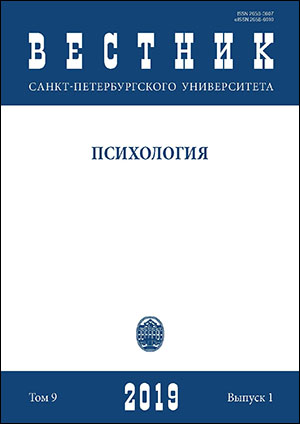Эффект отсроченного снижения узнавания знакомого материала как результат сочетания намерения забыть и приема генерирования ассоциаций
DOI:
https://doi.org/10.21638/11701/%20spbu16.2019.105Аннотация
В статье подвергается критике сложившаяся в современных исследованиях намеренного забывания ситуация игнорирования специфики мнемического действия и его уровневой структуры (цель и прием). Мы предположили, что нетривиальность задачи на забывание и отсутствие готовых амнезогенных приемов должны вызвать более яркие проявления эффектов целевой детерминации, чем традиционные, изучавшиеся в задачах на запоминание. С учетом полученных нами ранее данных о том, что как позитивные (запомнить), так и негативные (забыть) мнемические цели повышают уровень отсроченного узнавания полностью заученного материала, был разработан и реализован экспериментальный дизайн с варьированием изолированного и совместного предъявления мнемических целей и потенциально амнезогенных приемов в отношении неполно заученного материала. Участникам сначала трижды предъявлялся ряд из 20 стимульных пар вида "реальное слово — псевдослово". Основная манипуляция заключалась в рандомизированной демонстрации реальных слов из пар с инструкциями .Забыть., "Помнить", "Повторять вслух", "Забыть псевдослово, генерируя ассоциации к реальному слову" и тривиальной арифметической задачей. Узнавание корреспондирующих с реальными словами псевдослов производилось дважды — через четыре часа (N = 53) и через два месяца (N = 32) после манипуляции. В результате проведенного эксперимента был, во-первых, реплицирован факт стабильно высокого отсроченного узнавания псевдослов после попытки реализации изолированного намерения помнить или забыть. Во-вторых, было показано, что намерение забыть в сочетании с амнезогенным приемом подбора ассоциаций к реальному слову, наоборот, приводит к ухудшению отсроченного узнавания псевдослов. Таким образом, в исследовании был получен эффект намеренного забывания знакомого, но не заученного полно нового материала, который проявился в форме снижения его отсроченного узнавания без повышения процента ложных тревог. Необходимым условием манифестации данного эффекта являлось объединение в рамках экспериментальной манипуляции цели "Забыть" и приема генерирования ассоциаций. Полученный результат интерпретируется нами как формирование качественно своеобразного механизма регуляции памяти интегрированной структурой "цель — прием".
Ключевые слова:
намеренное забывание, мнемическое действие, мнемическая цель, амнезогенный прием, узнавание
Скачивания
Библиографические ссылки
Zhang Q., Qi M., Li F., Li H. // International Journal of Psychophysiology. 2016. Vol. 104. P. 1–9.
References
demand characteristics. Psychonomic Bulletin & Review, 1999, vol. 6, no. 1, pp. 123–129.
directed forgetting. Journal of Memory and Language, 2009, vol. 61, no. 1, pp. 134–152.
Загрузки
Опубликован
Как цитировать
Выпуск
Раздел
Лицензия
Статьи журнала «Вестник Санкт-Петербургского университета. Психология» находятся в открытом доступе и распространяются в соответствии с условиями Лицензионного Договора с Санкт-Петербургским государственным университетом, который бесплатно предоставляет авторам неограниченное распространение и самостоятельное архивирование.




